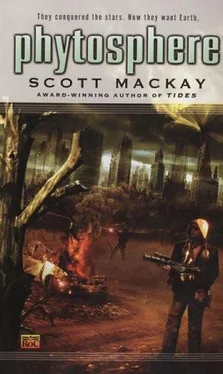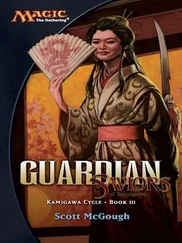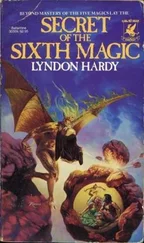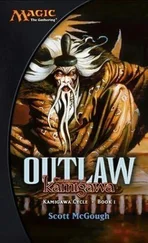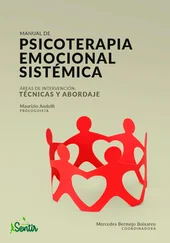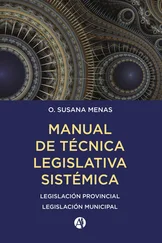Gerry shrugged. “As far as it goes, I guess. But the evidence is inconclusive yet.”
“Even in the new images? Does this…does it help get a better look at what your brother’s toxin is doing? Because I had to use that…that line of reasoning with Ira, even though I didn’t know what the hell I was talking about. Otherwise you would have been waiting forever.”
Gerry sighed. So. Here it was again. The hidden agenda. The new apparatus wasn’t meant to further his own research, but to confirm his brother’s. What else was new?
He glumly told the mayor the truth. “I’m not sure.”
The mayor gestured at the infrared views of Earth on the monitors. “How many blooms show deterioration?”
Gerry glanced at the monitor. “I count…five. And it looks as if they’ve just seeded another, so that makes six. It’s just that, you know…” He motioned at the screen. “It seems the phytosphere is catching on, getting an idea of what’s happening…like I said it would.”
“Gerry, please don’t say that.”
Gerry shook his head. “I’m just not sure yet. The hydrogen sulfide seems to be working in some blooms, and not in others. Omicron bloom, for instance. It’s hardly made a dent.”
The mayor’s smooth face flushed. “That’s not, like, the best news I’ve heard all day. Any way I can put a positive spin on it for Ira?”
He raised his brow, frustrated that the mayor should be looking at it this way. “I wouldn’t say it’s a complete bust, Malcolm. But the temperature relationships are complex.” The mayor’s face sank at this notion. “And I haven’t quite figured them out.” Hulke’s face sank further, as if Gerry’s inability to figure things out was just another breach in the confidence the mayor had placed in him.
“So there are… temperature relationships.” The mayor didn’t seem to like this at all. “Okay. Not what I was expecting, but if you could explain without getting too technical…so I have something to take back to Ira.”
Gerry collected his thoughts. “We should be getting an extremely cold infrared signature on the dead plant tissue, well into the darkest blues.”
“But?” The mayor’s pale eyes had now gone wide.
“Well…we have had a lot of blue, and all that tissue is disintegrating, but the disintegration in each bloom only reaches a certain point before it seizes up. It never gets beyond this green boundary here.”
Gerry pointed. “The green indicates that the plant material has actually grown inert. Not dead, just inert.
There’s no growth activity. It’s like an oak tree in winter. It’s still alive, but nothing’s happening.”
“So does that mean your brother’s failed?”
Gerry shrugged. “There’s been no regrowth in the affected areas. I wouldn’t call that failure, but I wouldn’t call it success either. Maybe what we’re going to get is a shroud with a lot of holes in it. Which is better than a shroud with no holes at all.”
“But if the U.S. keeps peppering the phytosphere with this hydrogen sulfide, and keeps starving the xenophyta… surely we’ll get rid of it once and for all.”
“I don’t know. This freeze-up action happens faster each time. It might reach a point where the seeding will stall the minute it hits the phytosphere.”
“But generally speaking, your brother’s had at least some initial success.”
“Given what I’m seeing here, I would say yes.”
The mayor stared at the images on the monitors. “And what about…you know…your own research?
Ira was asking about it.”
“He was?”
“He hasn’t entirely dismissed you, Gerry.”
Gerry’s eyebrows twitched upward. “That’s just the shot in the arm I was looking for, Malcolm.”
“He wanted to know about the… uh… anomalous band.”
Hearing this, Gerry had to rethink his opinion of Ira. He motioned at the monitors. “You can see the band a lot better using infrared.” He pointed. “It runs all the way from the north pole to the south pole.
On the infrared scale, it fluctuates into yellow, even into orange near the equator, and that means it’s generating a lot of heat. Heat means stress.”
“Stress?”
“Whenever things are under great pressure, or great stress, they heat up. This heat band from north to south indicates that the phytosphere comes under global cyclical stress. I’m still trying to understand it.”
“But it has nothing to do with your brother’s poison?”
“No. It was there before my brother used the hydrogen sulfide. I’m working on some models to explain it. It’s definitely not weather, like I first thought.”
“And as for the hydrogen sulfide thing? Come on, Gerry. Let’s try to be positive. Give me some good old Moon-spirited attitude.”
Gerry shook his head. “Malcolm, science isn’t a matter of positive or negative attitude. It’s simply a matter of…careful observation. You don’t want to cloud things up with any kind of attitude.”
They brought Gerry a cot and he stayed at the observatory around the clock. All the good food was gone, and he ate emergency rations, what the Moon had on hand in case of war, famine, or political unrest on Earth: mostly soup packs, rice cakes, and a dozen different pill supplements.
Members of the committee drifted in and out to watch the monitors, and Gerry could tell from the tightness at the corners of their eyes that they were anxious, still rooting for his brother, but nervous because it seemed to be taking so long.
Mitch Bennett came in and made a show of checking over the equipment, but his eyes kept drifting to the monitors, his small lips pursing, his brow settling. He seemed angry at the shroud. He finally left after saying in a sullen tone, “It’s like watching a piece of cheese ripen.”
The mayor came and went in various states of sobriety—and it wasn’t funny, because Gerry knew what it was like to be a drunk—always smelling of booze, for the most part holding it together but then slipping up with a slurred word or two, running off to the observatory washroom for a quick nip, joking about what they were going to do when all the booze ran out, and finally staring at the main monitor as if it were an oracle.
“Do you think you’re going to need a second Smallmouth still?” asked the mayor.
“Why? Is Ira changing his mind?”
“I’ll talk to Ira. He’s not…above fear.”
When the mayor left, Gerry spoke to Glenda again, because that was one great thing about Neil’s attempt: With the holes in the phytosphere, the lines of communication were open again.
“It seems to be stalling,” she told him. “At least from what I can see in Old Hill.”
“Any sign of Maynard?”
“No. But Buzz drove by again.”
“I had some good times with Buzz. Except for Marblehill. Marblehill was a disaster.”
“I wish he’d stop driving by. He came by last night. I heard his truck a mile away.”
Ian came in a number of times and, surprisingly, he took only a few nips from his flask.
Gerry commented on it.
Ian motioned at the monitors. “All this…makes a man think. I always told myself I’d sober up by the end of it all. I’m cutting back as much as I can.”
Stephanie came to visit him.
The minute she saw the monitors she said, “It’s not working.” And it was funny because Stephanie, nothing more than a showgirl, seemed to cut through the crap better than anybody else. “We’ve got to come up with something different fast.”
He studied the monitors and realized Stephanie was right.
Each new seeding brought no more than a pinprick of deterioration, tiny points of stasis where the hydrogen sulfide was trying to gain a meager toehold. It was as if the phytosphere was now putting up its best guard against the attack.
Читать дальше
